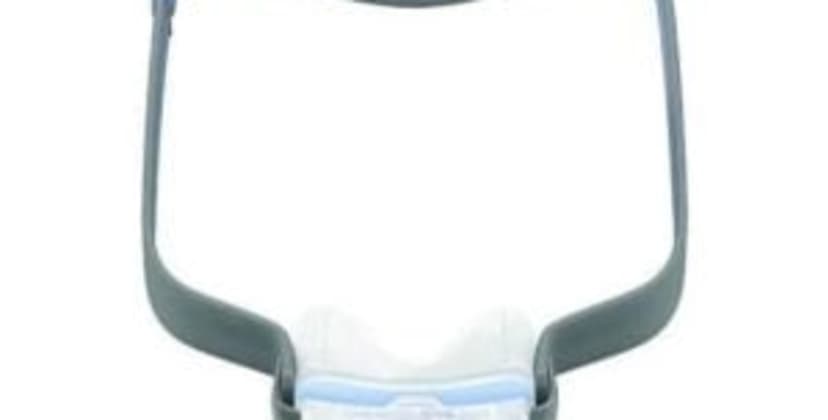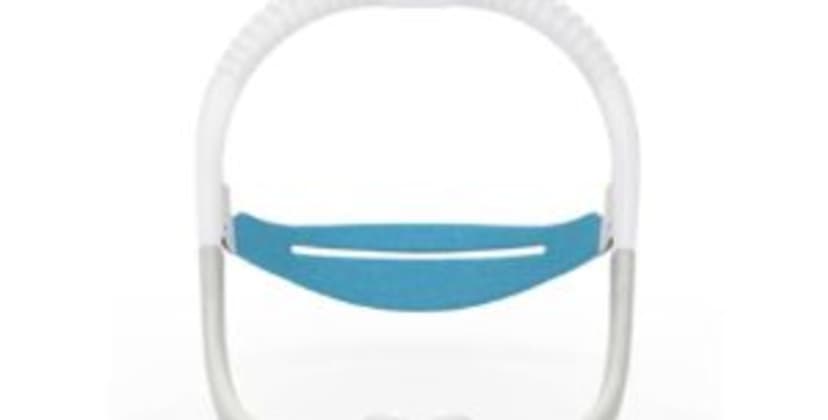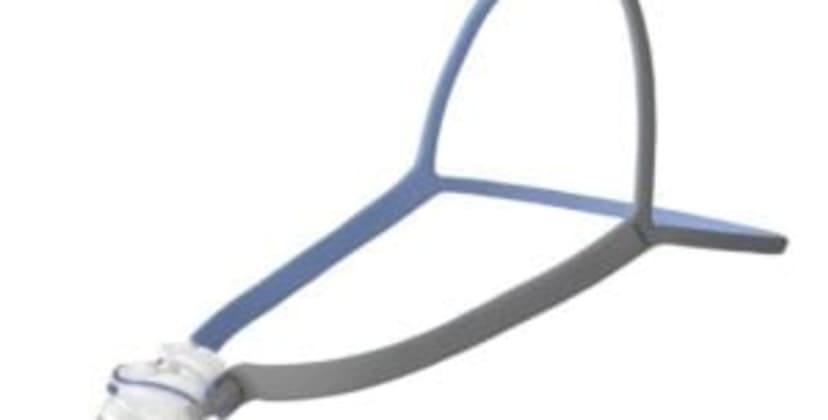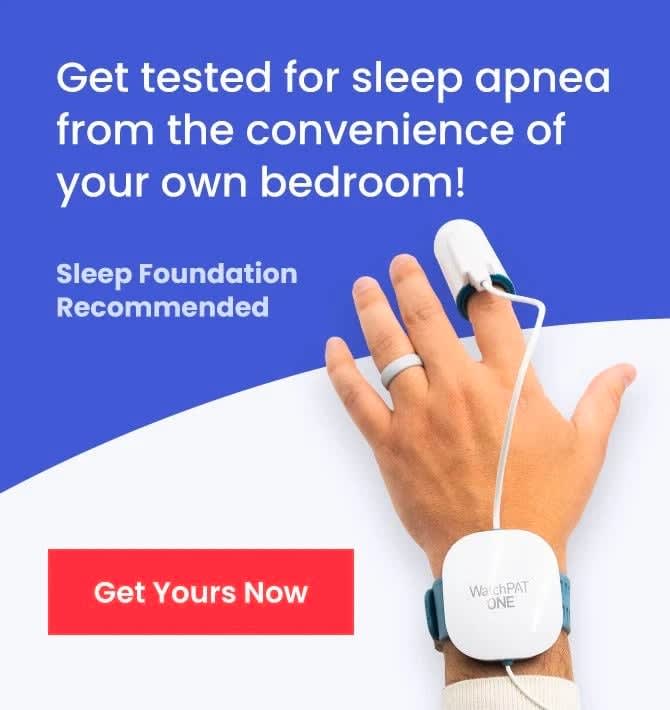When you buy through our links, we may earn a commission. Products or services may be offered by an affiliated entity. Learn more.
Best CPAP Mask for Beards in 2026
Choosing the best CPAP mask can be tricky, especially if you have facial hair. Beards can prevent certain mask styles from sealing properly, which can make it difficult for sleepers to get effective therapy.
Continuous positive airway pressure (CPAP) therapy pushes pressurized air into the breathing passages to help prevent airway collapse. It’s considered one of the best treatment methods for people with sleep apnea.
CPAP masks seal around your face and deliver air to your nose, mouth, or both. We’ll cover what types of masks work best with facial hair, our top picks, and ways to determine whether a certain mask will work for you.
In-Depth Reviews
Best Overall
ResMed AirFit N30 Nasal CPAP Mask with Headgear
Use this link for the most current ResMed discount
Shop Now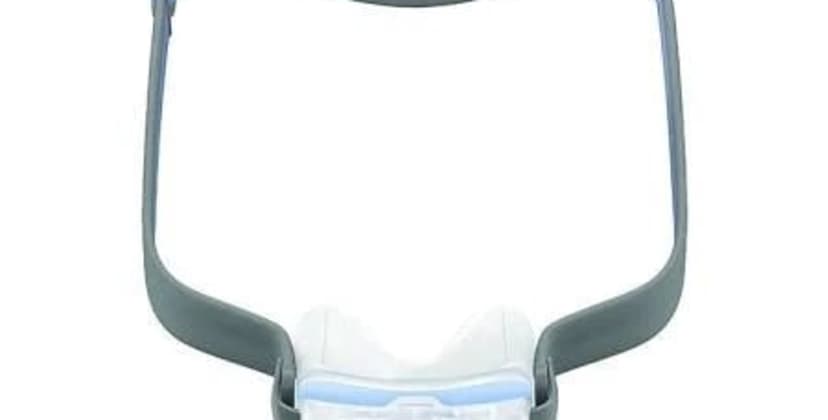
Who it’s best for
Mouth breathers
Light Sleepers
Couples
Highlights
Exhalation vent helps reduce noise during exhalation
Streamlined profile
Silicone cushions mold closely to nose
Price
$99
With easy adjustment, headgear that makes it easy to take the mask on and off, and quiet performance, the ResMed AirFit N30 is a good option for sleepers with beards who breathe through their mouth and want a less obtrusive mask. The functional design includes many thoughtful features and is an excellent choice for people who have a beard or other facial hair.
The mask is a comfortable alternative for people who find it difficult to tolerate a full-face mask. The nasal cushion has a streamlined profile, making CPAP therapy more comfortable for sleepers who prefer a less intrusive mask. The silicone material also conforms to your nose for increased comfort. The headgear has an elastic design that’s easy to place on your head and remove.
The mask has a special venting design that reduces noise that often accompanies expelled air. The quiet performance makes this mask a good choice if you share the bed with a partner, especially if you or your co-sleeper are a light sleeper.
Customers who shop through The Sleep Doctor will receive free shipping on purchases over $99. You can return unused and unopened masks within 30 days of the shipping date, minus a restocking fee.
Disclaimer: In November 2023, ResMed issued a safety notice cautioning that the magnetic clips on this model and other ResMed masks should be kept at least 6 inches away from any implanted medical device that may be affected by magnets, including pacemakers and insulin pumps. The company also warns that other metallic implants such as valves, stents, and certain dental implants may be impacted by the magnetic clips.
Best for New CPAP Users
ResMed AirFit P30i Starter Pack
Use this link for the most current ResMed discount
Shop Now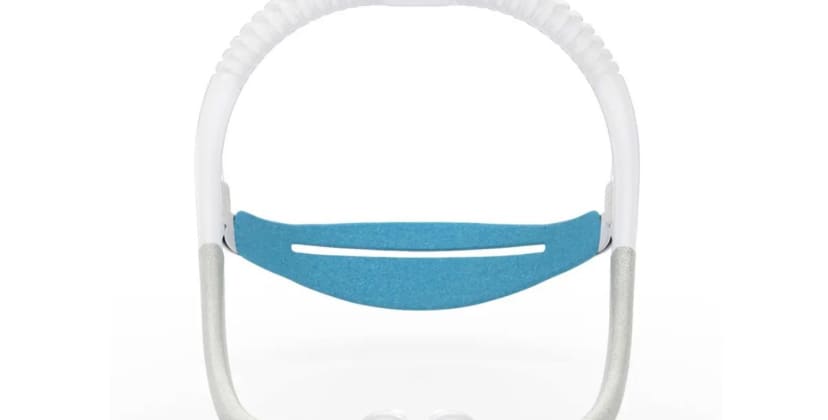
Who it’s best for
First-time CPAP users
Sleepers who aren’t sure of their ideal cushion size
Couples
Highlights
Includes cushions in multiple size options
Unobtrusive design minimizes facial contact
Quick-release elbow enables easy removal
Price
$115
If you’re new to CPAP therapy, it can be difficult navigating CPAP accessories to determine which ones are the best fit. The ResMed AirFit P30i Starter Pack is designed for first-time CPAP users who are looking for a comfortable and well-fitted mask.
The P30i has an over-the-head design and does not cover the forehead. This may appeal to users who prefer less obtrusive masks. The Starter Pack includes multiple size cushions to help you decide on the best fit. A standard-sized frame includes all cushion sizes, while the small-sized frame comes with small and medium cushions.
If you or a co-sleeper are easily awoken by noise, you may appreciate the mask’s QuietAir feature. This ventilated design helps reduce some of the noise that results from exhalation during CPAP therapy. The quick-release elbow makes it easy to slip the mask on and off, which is especially helpful for those who use the bathroom during the night.
If you purchase the P30i Starter Pack through The Sleep Doctor, you’ll qualify for free shipping. Customers have 30 days to return unopened and unused masks.
Most Comfortable
ResMed AirFit P10 Nasal Pillow CPAP Mask
Use this link for the most current ResMed discount
Shop Now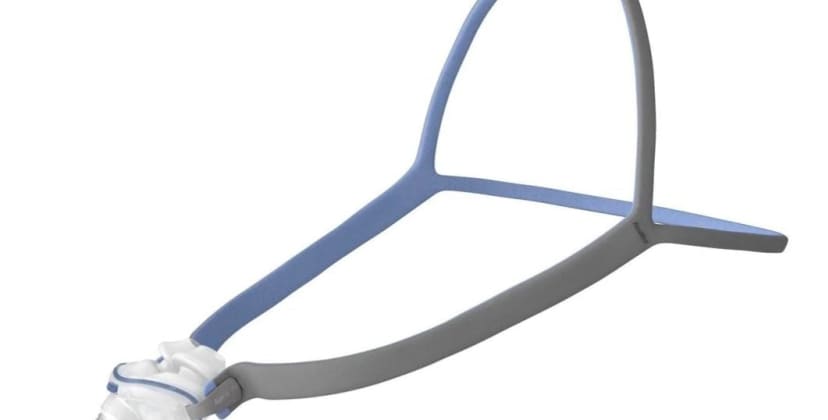
Who it’s best for
Sleepers who prefer a mask that does not cover the forehead
Those who are easily awoken by noise
People with sensitive skin
Highlights
Special vents help reduce noise
Lightweight construction
Split-strap design enhances comfort
Price
$99
Soft pads, minimal noise, and a lightweight design make the ResMed AirFit P10 a good option for those who experience discomfort or claustrophobia with other masks. Individuals looking for a CPAP mask that prioritizes comfort and fit should consider this model.
The P10 has a minimalist design compared to other models on the market, many of which are bulkier. The unique split-strap design helps secure the mask while reducing the amount of facial contact. This may appeal to sleepers with sensitive skin or who prefer to keep their face as unobstructed as possible. The headgear is made from a lightweight material that is intended to be comfortable and flexible. Users can easily disconnect the mask from the headgear using the quick-release clips on the sides of the mask.
The nasal mask fits around the sleeper’s nose to create a leak-free seal, and air vents help reduce noise by strategically diverting exhalations away from the mask. The mask comes with cushions in multiple sizes to let users decide on the right fit for their face shape. A standard model comes with small, medium, and large cushions. The “for her” model has smaller headgear and comes with extra-small, small, and medium cushions.
The Sleep Doctor backs this mask with a 30-day guarantee that allows shoppers to return their unused and unopened mask for a full refund within 30 days of shipping. Shipping is free within the contiguous U.S. for orders over $99.
How to Choose a CPAP Mask Made for Beards
When purchasing a CPAP mask, it’s important to consider the fit, cost, and compatibility with the machine you intend to use. If you have a beard, you’ll also need to make sure you choose a style that’s unlikely to leak because of your facial hair.
Certain mask styles are better than others at accommodating beards. Sleeping position, quality, ease of use, and overall comfort are also important considerations when shopping for a mask.
What to Consider When Purchasing a CPAP Mask for Beards
CPAP masks are medical devices intended to treat people with sleep apnea. When choosing any type of product that impacts your health, it’s important to consult your physician. It’s also critical to keep in mind that user experiences can vary widely, and what works well for one type of sleeper may not be right for you.
Masks are available in a wide range of shapes, styles, and constructions. This allows users to pick the best option for their facial structure and unique considerations, such as having facial hair.
Price
People with beards should expect to pay the same prices for a CPAP mask as people without facial hair. Many masks are naturally compatible with beards, and it doesn’t cost more to produce a mask that can accommodate one. Shoppers should expect to pay between $50 and $250 depending on the style and brand they choose. Additionally, certain insurance providers partially or fully cover CPAP masks.
Size and Fit
A properly fitting mask helps to ensure users get effective CPAP therapy. Air can escape from a mask that’s not sealed correctly, leaving you without adequate air pressure. A mask that’s too tight can create uncomfortable pressure points and red marks or indentations.
Beards can prevent masks from sealing properly, which can lead to leaks. Choosing a mask that fits correctly and accommodates your beard is important to ensure your therapy is effective. Many CPAP masks come in different size options, and shoppers should keep in mind that longer beards may require larger masks to accommodate their volume.
Compatibility
Following your sleep study, your doctor will create a PAP therapy plan that includes pressure settings specific to your needs. This may dictate which kind of mask you can use, as not all masks are compatible with every pressure setting.
Generally, CPAP machines can administer 4 to 20 centimeters of water pressure (cm H2O). Bilevel positive airway pressure (BiPAP or BPAP) machines typically have pressure settings that go up to 30 cm H2O. When used with higher pressure settings, nasal pillows can be uncomfortable.
In addition to pressure compatibility, you’ll want to ensure that the mask you choose works with your device and CPAP hose.
Sleep Position
Certain mask styles and sleeping positions work better together than others. Larger mask sizes are more likely to come into contact with your bed pillow, so it’s important to consider your preferred sleeping position while shopping for a CPAP mask to ensure you can sleep comfortably.
Back sleepers have the most versatility when it comes to choosing a mask. Full-face, nasal, and nasal pillow masks are all excellent options for back sleepers. Stomach and side sleepers typically find nasal and nasal pillow masks more comfortable, since they’re less likely to press into the bed pillow.
Comfort
Though it may take some adjustment, it is possible to find a CPAP mask that’s both functional and comfortable. Features like padded headgear, quick-release systems, and swivel joints for your hose are all accessory options that can increase your overall comfort during CPAP therapy.
Liners can also enhance a mask’s feel. These soft fabric barriers fasten to the frame or headgear to create a comfortable buffer between your skin and mask. Using a liner can also help keep your mask clean and extend its lifespan.
CPAP Pillow
CPAP pillows are designed especially for CPAP therapy. These innovative pillows have strategic shapes and cutouts designed to accommodate CPAP masks and hoses. Standard pillows may get in the way of your mask and its accessories, which can cause leaks or discomfort. CPAP pillows are particularly useful for side and stomach sleepers, as these two sleeping postures can make mask adherence difficult.
Quality Materials
Like any other medical device or accessory, it’s important to factor quality into your purchase. Buying a well-made mask may cost more upfront, but top-notch materials often last longer than their inexpensive counterparts, making a more expensive mask a better value overall.
Check to see if a CPAP mask you’re considering purchasing has a warranty or active recall. Customer reviews can also be helpful when deciding between different masks.
Cleaning and Care
Cleaning your CPAP mask regularly helps extend its lifespan and prevents mildew or bacteria buildup. Failing to properly care for your CPAP machine and accessories can cause discomfort and prevent you from getting effective therapy. Check the manufacturer’s individual cleaning directions to ensure you care for your mask properly. Otherwise, best practices indicate you should clean your CPAP mask daily with warm water and mild soap.
Tips to Ensure a Good CPAP Mask Seal With a Beard
People with beards may find it more difficult to find a suitable CPAP mask than those without facial hair. Getting a proper seal requires a bit more attention if you have a beard, but there are a few methods you can employ to ensure your mask stays leak-free and you stay comfortable.
- Condition your beard: Using a beard conditioner can help keep your skin and facial hair moisturized. It can also help prevent dandruff and keep your beard hair soft. Sealing a CPAP mask properly is easier if your beard is soft and conditioned rather than wiry and abrasive. Many people with beards overtighten their masks to compensate for leaks. Using a beard conditioner may help users avoid this.
- CPAP mask liners: Mask liners act as a barrier between your CPAP mask and skin. In addition to increasing overall comfort, mask liners can prevent beards from getting tangled in headgear. They also create a smooth surface for your mask, allowing it to seal against your face more effectively.
- Chinstraps: Chinstraps help provide a better seal for people who breathe through their mouth but use a nasal or nasal pillow mask. A chinstrap is a flexible piece of fabric that fits around your head to keep your mouth closed, allowing your nasal passages to get adequate air pressure. Using a chinstrap can also help prevent dry mouth.
You can use a chinstrap to keep your mask in place even if you use a full-face or oral mask. Some models designed for people with beards prevent the mask from sliding up your head or off your beard.
What Type of CPAP Mask Is Best for Beards?
The best CPAP mask for beards is one that seals against the skin despite the presence of facial hair. Nasal pillows, nasal masks, and oral masks typically have streamlined designs that minimize contact with the face. This prevents facial hair from interfering with the mask’s seal and helps to prevent leaks.
Nasal pillows and nasal masks deliver pressurized air to your nose. Though they have slightly different designs, these two mask styles feature a bottom edge that sits just beneath your nose, which allows for minimal contact with your beard.
Full-face masks can be difficult for people with thick or long beards, though properly conditioning your beard and using a chinstrap can help sleepers achieve a more comfortable fit. Oral masks can also be a good alternative to full-face masks, as they push air directly into the mouth and fit around the lips where there is less facial hair.
Full-Face Mask
Full-face CPAP masks cover the user’s nose and mouth, making them excellent choices for people who breathe through their mouth or those who alternate between their nose and mouth. Of the most common CPAP mask styles, full-face masks are the largest and can be the most difficult to use with facial hair.
Full-face masks are best for people with mustaches, goatees, or short beards. People with full beards may experience leaks. Using a chinstrap can help keep a full-face mask in place. Conditioning your beard can also help, as the mask can seal more effectively to a soft beard than an abrasive one.
| Who it’s Best for: | Considerations: |
|---|---|
|
|
Nasal Mask
Nasal masks fit around the user’s nose. While designs vary depending on manufacturer, most nasal masks are circular or triangular. The top crosses the bridge of the nose, and the sides seal to the skin on the outsides of the nose. The bottom sits beneath the nostrils and above the upper lip.
Due to the nasal mask’s shape, there is little room for facial hair to come into contact with the mask. People with beards should find that they can use a nasal mask without their facial hair causing significant leakage. If you’re not a natural nose breather, you may need to wear a chinstrap to help keep your mouth closed.
| Who it’s Best for: | Considerations |
|---|---|
|
|
Nasal Pillow Mask
Nasal pillow masks are one of the best options for people with beards. This is the smallest mask style and least likely to become dislodged by facial hair. Nasal pillow masks have a small cushion that fits snugly beneath the nose and seals against the nostrils.
The low-profile design is a good option for active sleepers and people with various types of facial hair, including full beards. Nasal pillows can be uncomfortable for people who require high CPAP pressure settings. Mouth breathers may need to wear a chinstrap to help keep their mouth closed.
| Who it’s Best for: | Considerations: |
|---|---|
|
|
Frequently Asked Questions
What is the best type of CPAP mask for beards?
The best type of CPAP mask for beards is typically a nasal pillow, which has very little contact with your facial hair. However, full-face masks and nasal masks can also be excellent choices for people with beards. The key to choosing a mask for a beard is to get one that fits both your face and beard properly.
If you have a large beard, headgear that attaches above your facial hair can help you get a better fit. A mask that fits correctly should seal against your skin without causing discomfort, even if you have a beard.
Can a beard cause a CPAP mask to leak?
If your beard is long, coarse, or thick, it may cause leaks if used with an improperly fitting CPAP mask. When wearing a CPAP mask, the cushion should seal around your nose, mouth, or both without needing to tighten the headgear too much. Long beards can prevent masks from properly sealing, and coarse hair may cause your mask to shift.
Choose a CPAP mask that’s intended for users with facial hair and consider using a beard conditioner to address coarse hair or a chinstrap to prevent your mask from dislodging.
Can you wear a full-face CPAP mask with a beard?
You can wear a full-face CPAP mask with a beard, though you should take care to ensure it fits correctly to prevent leaks. People with short beards or goatees may have an easier time tolerating a full-face mask than those with long or thick beards. Full-face masks fit around the nose and mouth, so it may be difficult to seal a full-face mask around a full beard. Most CPAP mask manufacturers indicate whether or not a CPAP mask is beard-friendly.

Still have questions?
Our product experts have extensive experience testing just about every sleep product on the market.
Send an email to AskAnExpert@sleepfoundation.org with your questions and we’ll help you find exactly what you’re looking for.

